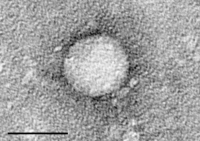
Photo from wikipedia
Background and Aims: Sex hormones are widely recognised to act as protective factors against several viral infections. Specifically, females infected by the hepatitis C virus display higher clearance rates and… Click to show full abstract
Background and Aims: Sex hormones are widely recognised to act as protective factors against several viral infections. Specifically, females infected by the hepatitis C virus display higher clearance rates and reduced disease progression than those found in males. Through modulation of particle release and spread, 17β-oestradiol controls HCV’s life cycle. We investigated the mechanism(s) behind oestrogen’s antiviral effect. Methods: We used cell culture-derived hepatitis C virus in in vitro assays to evaluate the effect of 17β-oestradiol on the innate immune response. Host immune responses were evaluated by enumerating gene transcripts via RT-qPCR in cells exposed to oestrogen in the presence or absence of viral infection. Antiviral effects were determined by focus-forming unit assay or HCV RNA quantification. Results: Stimulation of 17β-oestradiol triggers a pre-activated antiviral state in hepatocytes, which can be maintained for several hours after the hormone is removed. This induction results in the elevation of several innate immune genes, such as interferon alpha and beta, tumour necrosis factor, toll-like receptor 3 and interferon regulatory factor 5. We demonstrated that this pre-activation of immune response signalling is not affected by a viral presence, and the antiviral state can be ablated using an interferon-alpha/beta receptor alpha inhibitor. Finally, we proved that the oestrogen-induced stimulation is essential to generate an antiviral microenvironment mediated by activation of type I interferons. Conclusion: Resulting in viral control and suppression, 17β-oestradiol induces an interferon-mediated antiviral state in hepatocytes. Oestrogen-stimulated cells modulate the immune response through secretion of type I interferon, which can be countered by blocking interferon-alpha/beta receptor alpha signalling.
Journal Title: Viruses
Year Published: 2022
Link to full text (if available)
Share on Social Media: Sign Up to like & get
recommendations!